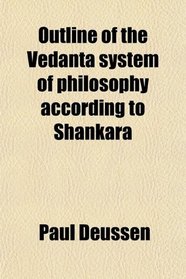Search -
Outline of the Vedanta system of philosophy according to Shankara
Outline of the Vedanta system of philosophy according to Shankara
Author:
Purchase of this book includes free trial access to www.million-books.com where you can read more than a million books for free. This is an OCR edition with typos. Excerpt from book: 3. No less the fundamental assumption of the Vedanta system contradicts the canon of the Vedic ritual: this indeed assumes a survival7 of the self be- Cont... more »
Author:
Purchase of this book includes free trial access to www.million-books.com where you can read more than a million books for free. This is an OCR edition with typos. Excerpt from book: 3. No less the fundamental assumption of the Vedanta system contradicts the canon of the Vedic ritual: this indeed assumes a survival7 of the self be- Cont... more »
ISBN-13: 9780217265591
ISBN-10: 0217265596
Publication Date: 8/10/2009
Pages: 80
Rating: ?
ISBN-10: 0217265596
Publication Date: 8/10/2009
Pages: 80
Rating: ?
0 stars, based on 0 rating
Genres:




